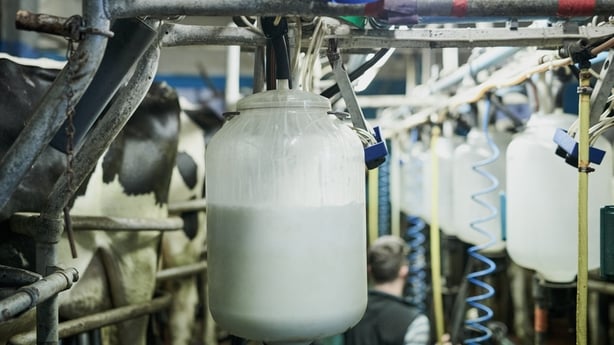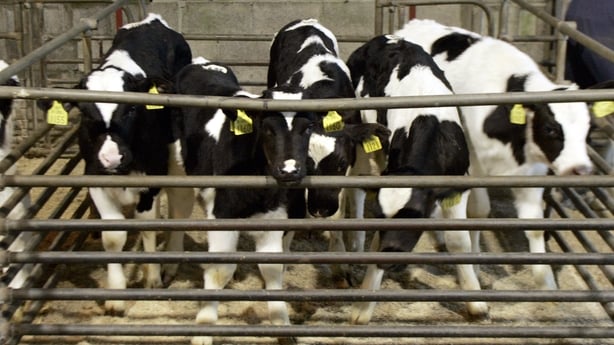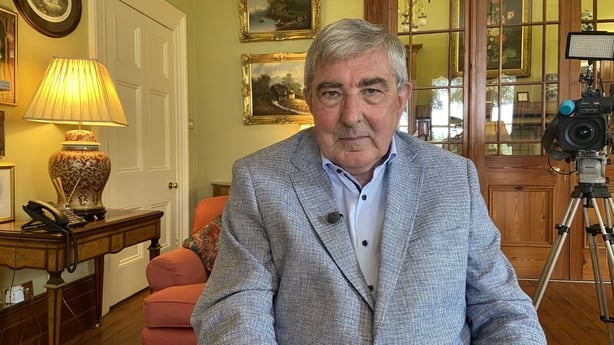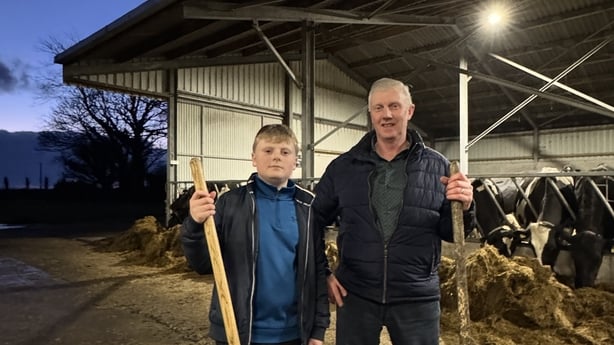Farmers to vote on €500m Kerry Group dairy assets deal

Farmers across Munster who are shareholders of Kerry Co-op will vote later today on a deal to buy back the dairy processing assets of Kerry Group for €500 million.
The deal for Kerry Group Plc’s consumer foods and dairy ingredients business, Kerry Dairy Ireland, is multifaceted.
In addition to the buyback, it also offers the farmers and other shareholders in Kerry Co-op – just under 12,000 people – a route to turn €1.4 billion worth of co-op shares into cash.
The deal, therefore, has the potential to deliver a huge financial injection into the Kerry economy and the economy of the wider Munster region.
That injection could begin as soon as the end of January.
If the deal is passed, shares in Kerry Co-op will be exchanged for Kerry Group shares, allowing farmers and shareholders to trade on the stock market and to cash in their holdings at a time of their individual choosing.
Up to now, they were reliant on an unofficial or so-called grey market to trade co-op shares, or on redemption schemes run twice yearly.
Kerry Co-op and Kerry Group
Kerry Co-op and Kerry Group are two separate entities which have existed in parallel – both reliant and dependent on each other.
Kerry Co-op provided the initial investment, the seed capital. Kerry Group was the massive wealth-generating vehicle which Kerry Co-op created.
Kerry Co-op was established to process the milk of dairy farmers in Kerry in January 1973.
From a caravan in a field on the banks of the River Feale in Listowel, the story of its development, the subsequent launch of the publicly-quoted Kerry Group in 1986 and the success of the company’s global march is phenomenal.
Today, Kerry Group describes itself as a leader in science-backed, sustainable nutrition. The company has manufacturing facilities at 135 locations in 36 countries.
It employs 21,000 people and exports to over 150 countries.
Kerry Group has annual revenues of €8 billion.
The farmers who set up Kerry Co-op – the fore-runner to Kerry Group – did so with an investment of just over just over £1 million.
The €1.4bn in Kerry Group shares which this deal will release if it passes, will be only part of the dividend from that initial investment.
Another €250m worth of Kerry Group shares held by Kerry Co-op will be used to part fund the buyback of Kerry Dairy Ireland.
Today’s vote is therefore a hugely significant transaction in Irish corporate history and it is of particular importance to the economy of Kerry and of Munster.
When Kerry Group was launched in 1986, Kerry Co-op was its largest shareholder, retaining 90% of the business.
Kerry Co-op remains the largest shareholder in Kerry Group today, although its shareholding has reduced significantly to 11% worth around €1.7 billion.
Since Kerry Group was launched, there has always been an inter-relationship between it and Kerry Co-op.

Kerry Co-op has 11,906 shareholders. These are divided into three categories: A shareholders are actively supplying milk to Kerry Group; B shareholders have ceased to supply milk to Kerry; C shareholders typically acquired their shares through inheritance or through commercial purchases.
There are 5,577 A and B shareholders in Kerry Co-op and they are the only ones eligible to vote today. The remaining 6,329 C shareholders do not have voting rights.
Voting takes place at noon at the Gleneagle Hotel’s INEC in Killarney. Voting must be done in person – there will be no postal or proxy votes.
The resolution will have to be carried by two-thirds of those who vote, plus one, in order to pass.
Huge interest
Since the announcement just over a month ago that Kerry Co-op and Kerry Group had reached agreement on the terms of the proposed deal, there’s been huge interest.
Kerry Dairy Ireland is a leading dairy and ingredients business. It has six manufacturing facilities across Ireland and the UK, with a portfolio of dairy food brands which includes Cheestrings, Dairygold, EasiSingles, LowLow, Kerrymaid and Charleville.
The company processes more than 1.1 billion litres of milk annually, from 2,740 family farms in Munster.
Last year, Kerry Dairy Ireland delivered sales of €1.3bn exporting to 58 countries. The company also employs 1,500 staff, who will transfer with the business if the deal is approved.

However, it is on the dairy processing side of the business – and on the €500m price tag – that most interest has focused since the deal was announced.
There have been over a dozen shareholder and information meetings, organised by Kerry Co-op and others, in counties Kerry, Clare, Limerick and Cork, reflecting the current geographic spread of Kerry Group’s milk suppliers, as well as the concentration of the Kerry Co-op shareholders, who are primarily located in Munster.
Support and opposition to the deal
The meetings, where the financial details of the deal were parsed and analysed, were each attended by hundreds of people.
The deal has also been a hot topic in the local and trade media, reflecting its importance in farmhouses and marts and elsewhere throughout the region.
It is wider than a purely rural issue: it is equally important in towns like Tralee and Killarney, Charleville, Adare and Ennis, whose economic fortunes are heavily dependent on their agricultural hinterlands.
There is both support for and opposition to the deal, but it is difficult to quantify how much of each there is.
Those in favour of the deal claim to have the numerical strength over those who are against it. But, even if that is the case, those who oppose the deal only have to muster one-third of the votes to get their way, because of the two-thirds requirement for the resolution to pass.
The bar for those who want to see this deal through is set very high.

Arguably, one of the most significant interventions so far has come from the former chief executive of Kerry Group, Denis Brosnan – the first employee of Kerry Co-op back in 1973, and the man credited – along with Hugh Friel and Denis Cregan – with much of Kerry Co-op and Kerry Group’s early success.
In an Irish Farmers Journal podcast on Wednesday last, Denis Brosnan spoke strongly in favour of a yes vote.
“I cannot understand how anybody would vote against it,” he told the Farmers Journal Editor, Jack Kennedy.
The following day, in an interview with Radio Kerry, he went even further in advocating a yes vote, describing what’s proposed as “the deal of the century”.
“It’s win, win, win for everybody,” Mr Brosnan said, referring to the A, B and C shareholders, all of whom will get something different if the deal goes through.
“I know some people will vote against for a lot of reasons but, as regards the deal itself and the release of money, it’s unprecedented,” he added.
Some farmers who are opposed to the deal and who spoke to RTÉ News since those comments were broadcast sought to downplay them, saying Mr Brosnan was speaking with a Kerry Group hat on.
It is over 20 years since Mr Brosnan stepped down as Kerry Group chief executive.
“It’s nothing to do with the PLC,” he said, when RTÉ News put those assertions of bias towards the company to him.
Mr Brosnan explained that he had made a pact – as much with himself as with the people of Kerry – during his early days as chief executive of Kerry Co-op. And the promise he made was to create a broader-base for wealth generation into the future than the one which Kerry Co-op was offering and which was so heavily reliant on milk price alone.
Mr Brosnan said Kerry Group was the vehicle to deliver that promise.
“I set out to make money for Kerry people and, for me, it’s the absolute perfect ending, because the end is what I set out to do: to release back into the community,” Mr Brosnan told RTÉ News.
“The only thing I couldn’t have envisaged is that there would have been €1.6 or €1.7 billion to take out today,” he said.
At the shareholder level, many farmers are considering what way they will vote.

Eoghan McCarthy’s mind was made up a long way out.
He is milking 160 cows on 240 acres at Callanafersy near Milltown in Co Kerry, where the River Laune meanders into Castlemaine Harbour.
Mr McCarthy is the fourth generation of his family to farm there. He and his wife Sinead hope one of the couple’s two children, 13-year old Niamh and 11-year-old Dylan, will follow him into farming.
Mr McCarthy will be voting yes in favour of the proposed deal.
“I think it’s a very good deal. I think it’s going to tick a lot of boxes for a lot of people. For us as a family and a farm here, it secures our future going forward for myself and my family,” Mr McCarthy said.
“For Dylan here beside me, or Niamh, or any of the younger farmers in the area, it’s giving them security. It’s giving them a future. I’ll be voting yes anyway, and I’d be encouraging the farmers to vote yes,” he added.
The farmer said he would be fearful of who might acquire Kerry’s dairy processing assets if the deal on the table between Kerry Group and Kerry Co-op is rejected by shareholders in today’s vote.

James Doyle, 15km away at Kilgobnet, Beaufort, has handed his 150-acre dairy farm over to his son, Brendan.
His two other sons, Jimmy and Robert, are farming elsewhere.
Mr Doyle is Chairman of the Munster Dairy Producer Organisation.
It claims a membership of more than 300 farmers who, together, produce 200 million litres of milk per year.
In April, the Munster Dairy Producer Organisation was given official recognition by the Department of Agriculture and Food.
James Doyle is also a former Chairman of Kerry Co-op and he represented milk suppliers when a dispute with Kerry Group on milk price went to arbitration.
As part of this deal, Kerry Group will put a €50 million fund on the table to finally resolve the long-running milk price dispute.
James Doyle objects to the way the different elements of the deal have been bundled together, but he says the principal reason why he will be voting no today is because he believes Kerry Dairy Ireland is overpriced at €500 million.
He believes the burden of paying for the buyback will be unsustainable on milk suppliers like his three sons.
“It’s our belief that it’s being over-valued and we’re being told that it’s being over-valued by €250 million,” Mr Doyle said.
“If it goes forward at €500 million, and total costs going forward up to €650 million, these milk producers have no chance of surviving,” he added.
Mr Doyle believes it will be possible to re-negotiate the purchase price for Kerry Dairy Ireland, if the deal does not get the required two-thirds vote.
“No deal is far better any day of the week than a bad deal,” he insists.
It is against this backdrop that around 2,000 of the 5,577 Kerry Co-op shareholders eligible to vote will gather for a Special General Meeting at noon, on the shores of the Lakes of Killarney, during which the voting will take place.
A result is expected by mid-afternoon.


